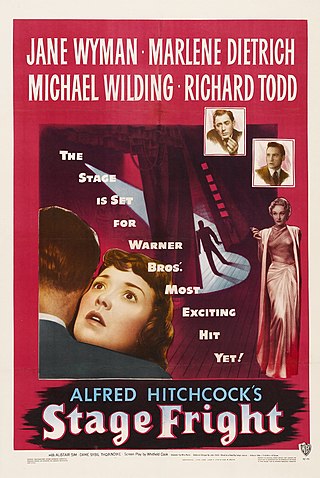Related Research Articles
Feminist film theory is a theoretical film criticism derived from feminist politics and feminist theory influenced by second-wave feminism and brought about around the 1970s in the United States. With the advancements in film throughout the years feminist film theory has developed and changed to analyse the current ways of film and also go back to analyse films past. Feminists have many approaches to cinema analysis, regarding the film elements analyzed and their theoretical underpinnings.
Dame Katherine Patricia Routledge is an English stage, television and film actress, and singer. She is best known for her comedy role as Hyacinth Bucket in the popular BBC sitcom Keeping Up Appearances (1990–1995).

Stage Fright is a 1950 British thriller film noir directed and produced by Alfred Hitchcock and starring Jane Wyman, Marlene Dietrich, Michael Wilding and Richard Todd. The cast also features Alastair Sim, Sybil Thorndike, Kay Walsh, Hitchcock's daughter Pat Hitchcock in her film debut, and Joyce Grenfell in a vignette.

Hetty Wainthropp Investigates is a British crime drama television series, starring Patricia Routledge as the title character, Henrietta "Hetty" Wainthropp, that aired for four series between 3 January 1996 and 4 September 1998 on BBC One. The series, spawned from a pilot episode entitled "Missing Persons" aired by ITV in 1990, was co-created by writers David Cook and John Bowen, co-starred Derek Benfield as Hetty's patient husband Robert, and Dominic Monaghan as her assistant and lodger Geoffrey Shawcross.

Marjorie Burnet Rambeau was an American film and stage actress. She began her stage career at age 12, and appeared in several silent films before debuting in her first sound film, Her Man (1930). She was twice nominated for the Academy Award for Best Supporting Actress for her roles in Primrose Path (1940) and Torch Song (1953), and received the 1955 National Board of Review Award for Best Supporting Actress for her roles in A Man Called Peter and The View from Pompey's Head.

A Stranger Came Home is a 1954 British film noir directed by Terence Fisher and starring Paulette Goddard, William Sylvester and Patrick Holt. The film was produced by Hammer Films at Bray Studios with sets designed by the art director J. Elder Wills. It is based on the 1946 novel Stranger at Home, which was credited to film actor George Sanders but was actually ghostwritten by Leigh Brackett. It was released in the United States by Lippert Pictures under the title The Unholy Four.

Night Tide is a 1961 American independent fantasy film sometimes considered to be a horror film, written and directed by Curtis Harrington and featuring Dennis Hopper in his first starring role. It was filmed in 1960, premiered in 1961, but was held up from general release until 1963. The film's title was inspired by some lines from Edgar Allan Poe's poem "Annabel Lee". The film was released by American International Pictures as a double feature with The Raven.
The 35th Annual Tony Awards was broadcast by CBS television on June 7, 1981, from the Mark Hellinger Theatre. The hosts were Ellen Burstyn and Richard Chamberlain. The theme was "Women's Achievements in the Theatre."

When We Are Married is a comedy by the English dramatist J. B. Priestley. Written in 1934, it was first performed in London at the St. Martin's Theatre, London, on 11 October 1938. It transferred to the larger Prince's Theatre in March 1939 and ran until 24 June of that year.

Shirley Grey was an American actress. She appeared in more than 40 films between 1930 and 1935.
"I Dies from Love" is the eighth episode of the first series of the British television series, Upstairs, Downstairs. The episode is set in the summer of 1907.
Patricia Elvira Hake, known as Elvi Hale, is a retired British actress. She played Anne of Cleves in The Six Wives of Henry VIII, broadcast in 1970.

Dead Men Tell No Tales is a 1938 British thriller film directed by David MacDonald and starring Emlyn Williams, Sara Seegar and Hugh Williams. It is based on the 1935 novel The Norwich Victims by Francis Beeding. The film was made at Welwyn Studios.
A Society Scandal is a 1924 American silent drama film directed by Allan Dwan, and starring Gloria Swanson and Rod La Rocque. Distributed by Paramount Pictures, the film is based on a 1922 play The Laughing Lady, by Alfred Sutro which starred Ethel Barrymore in 1923 on Broadway and originally in 1922 with Edith Evans in UK.

Patricia Donahue was an actress who performed in television and films from 1956 to 1984.
Ken Hodges (1922–2005) was a British cinematographer of film and television. He began as an assistant cameraman just after the Second World War.
Winning Widows is a British television sitcom which first aired on ITV between 1961 and 1962. It stars Peggy Mount and Avice Landone as Martha and Mildred, two widowed sisters who move in together.

Mann's Best Friends is a British television sitcom which first aired on Channel 4 in 1985 It is set in a boarding house where the easy-going landlord fails to control the antics of his chaotic tenants, leading him to seek the assistance of the domineering Hamish James Ordway who has recently retired from the Water Board.
Moving Story is a British comedy drama television series which aired on ITV in two series between 26 May 1994 and 29 August 1995. It was created by Jack Rosenthal as a spin-off from his 1984 film The Chain, about a group of removal men.
Tarbuck's Luck is a British television variety show which aired on BBC 1. It appeared for one-off episode in 1970, then returned as a full six-part series in 1972. Hosted by Jimmy Tarbuck, who had been signed up by the BBC following his success on ITV's Sunday Night at the London Palladium, it combined a mixture of stand-up comedy, sketches and musical performances.
References
- ↑ Maxford p.569